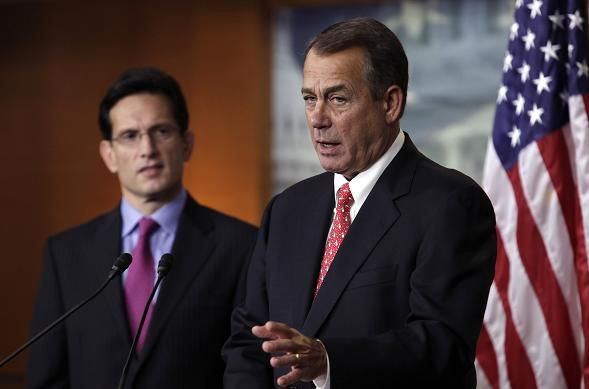Did A Fading Tea Party Lead Boehner To Abandon Spending Cuts For Debt Ceiling Increase?

A few weeks ago, some tough-talking Republicans were adamant in their willingness to allow the United States government to default on its obligations by refusing to lift the debt ceiling without a one-for-one spending cut deal.
Now, less than a month before Feb. 15, the date when the nation is expected to hit its debt ceiling, Republicans have huddled together and decided on a tactical retreat. They say America cannot become a deadbeat nation. So the GOP is expected to vote on a bill that would extend the government’s borrowing authority and buy the parties some time to negotiate a formal budget.
Moreover, it appears that House Speaker John Boehner, who was embarrassed by his raucous caucus last year when it rebuffed a fiscal cliff proposal he drafted, has regained strength. Some experts view Boehner’s desertion of the one-for-one idea as a sign of hope that more compromises may be coming and some deal-making may actually get done in the 113th Congress.
How is this possible? For starters, Boehner may no longer be concerned about the small tea party faction in his caucus, whose once powerful voice has grown ever so dim.
According to Albert Cover, a political science professor at Stony Brook University, Boehner appears to no longer worry about his party's tea party faction.
Tea partiers are sticklers for fiscal responsibility. They advocate for reductions in spending, the national debt and the deficit. Members of the Tea Party adamantly argue that Washington should live within its means and quit using debt to fund spending.
Even so, the voice of the tea party isn’t as loud as it was circa 2009, when it supported political candidates and protested against agendas it felt weren’t the best for the economy.
“It seems to me the simplest reading of the abandonment of the one-for-one principle is that the result of the last election may have led Republicans to conclude that they needn’t be worried about Tea party challenges,” Cover said. “They seem less influential. It seems to have lost some of its clout and unity. It seems like a fringe group inside the Republican Party. It doesn’t have the same ominous quality since before the election.”
Republicans failed to take over the Senate in the 2012 election. The balance of power in Congress remains unchanged, as Republicans still hold on to the House. What's more, Republicans lost almost all of the critical races it set out to win, and two tea party-backed candidates suffered dismal losses because of their controversial rape and pregnancy comments.
Missouri Rep. Todd Akin suffered a politically self-inflicted wound last summer when he spoke of “legitimate rape.” Those comments, which several Tea Party groups disowned, contributed to the reelection of U.S. Sen. Claire McCaskill, D-Missouri, 54 percent to 39 percent, even though opponents were trying to portray her as fiscally irresponsible.
Tea Party group FreedomWorks, which had endorsed John Brunner, decline to supported Akin even before he got the nomination.
Then there was Richard Mourdock in Indiana, who was hurt electorally because of his own controversial rape comments.
The tea party did notch several wins in November 2012. Rising Tea Party star Ted Cruz was elected to the U.S. Senate from Texas. Cruz gained national attention when he defeated Lt. Gov. David Dewhurst, who had the full backing of the GOP establishment, in the Texas GOP Senate primary.
Further, although the Tea Party registered a poor Senate performance in November 2012, Dean Clancy, the vice president of public policy at the tea-party-affiliated group FreedomWorks, wouldn’t call the tea party a passing fad. However, with Boehner showing no fear, Clancy doesn’t fault anyone for thinking the tea party’s ship sank. But he cautions against a rush to judgment. Clancy said the tea party's compromise isn't an indication that the faction is fading.
“I think if anything, the tea party’s influence has increased,” Clancy said.
Boehner’s announcement in a closed-door meeting on Tuesday that he is supporting a plan to balance the federal budget in just 10 years is enough proof that the tea party movement is still making waves in Washington, Clancy said.
“They are embracing something we’ve been saying for two years,” Clancy added. “After this disappointing election, all Republicans had to reassess, including the tea party.”
Right now, Clancy said, the tea party folks are weary of being perceived as overreaching.
“Boehner is chastened by his rebuff of the fiscal cliff debate,” he said. “If anything, the tea party and the establishment are being driven closer together.”
© Copyright IBTimes 2024. All rights reserved.






















